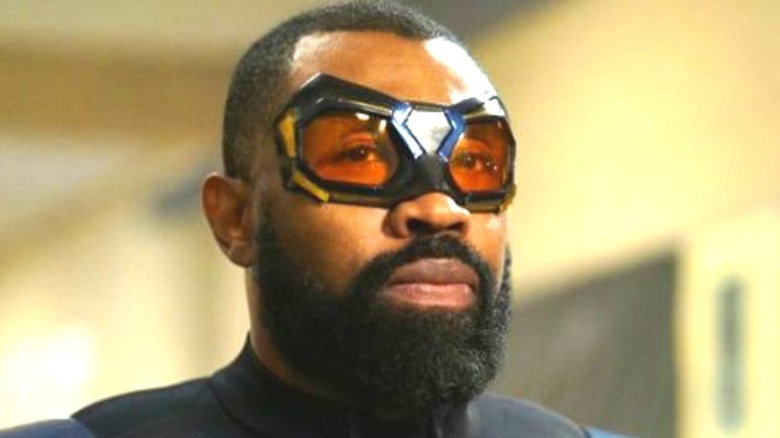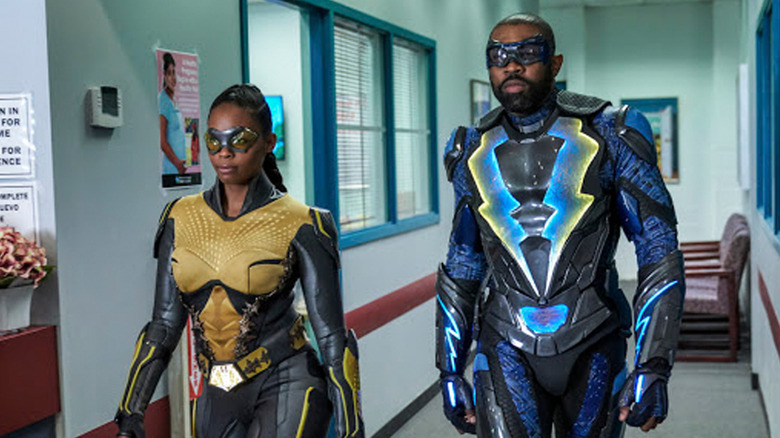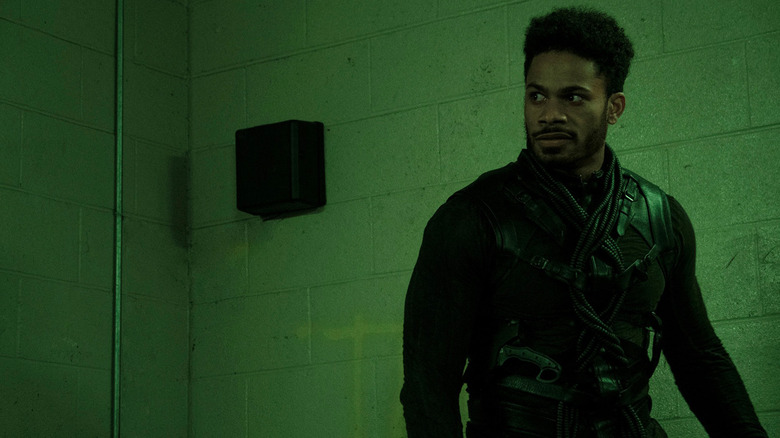The Ending Of Black Lightning Season 4 Explained
"Black Lightning" is one of the more unique superhero shows from the Arrowverse in recent years. While many other superheroes have struggled to balance their personal and professional lives (see: Batman's dating history), "Black Lightning" commits to the idea more sincerely than most. Based on the DC Comics character, "Black Lightning" follows Jefferson Pierce, principal of a high school in the small town of Freeland, Georgia. He's also the retired superhero Black Lightning, who left the lifestyle after it contributed to his divorce. Or at least he used to be retired, until crime boss Tobias Whale and his syndicate The 100 arrive in town and start causing mischief. This forces Jefferson to resume his Black Lightning identity.
The arrival of The 100 has another unexpected consequence: it leads Jefferson's daughters, Anissa and Jessica, to become superheroes themselves. At first, this just gives Jefferson even more superhero-related worries. But over the course of the show's four seasons, Anissa and Jessica have proven to be indispensable in the effort to clean up Freeland.
A lot happens in the Season 4 finale. Jefferson finally defeats and kills Tobias, allowing Freeland to be peaceful for the first time. Then he retires Black Lightning a second time, stepping aside so his daughters can take over.
Unfortunately for "Black Lightning" fans, the show was canceled after Season 4, one season before the planned conclusion to the Jefferson Pierce story. So while Jefferson and his family have come a long way, they still had a little bit further to go.
Season 4 of Black Lightning is all about moving on from your past
"Black Lightning" is unusual for superhero shows in that the superhero's personal life is arguably more important than their crime fighting. Jefferson Pierce has been trying to leave behind his past as a superhero because of the toll it's taken on his family, yet he has no choice but to resume his Black Lightning alter ego and protect his town of Freeland.
In the Season 4 finale, Jefferson is finally able to retire like he's always wanted to and focus on his relationship with his ex-wife Christine, who's decided to get back together with him. He's able to do this because he's spent the past four seasons training Freeland's next generation of superheroes, including his daughters Anissa and Jennifer.
But it's not exactly a happy ending. "Black Lightning" was supposed to last five seasons, and the fifth would have seen Jefferson and his family get a truly happy send-off.
"[In Season 5] I wanted to then go into the idea of a cohesive, beautiful working relationship between [the Pierce family], where we get rid of the tension and get to focus on the idea of actually saving the city and cleaning it up," Showrunner Salim Akil explained to Entertainment Weekly. "I wanted to see Freeland cleaned up, and I was really looking forward to the viewers being able to see how a person would go about it."
It's nice to know that Jefferson would have gotten where he needed to go, but fans probably would have appreciated actually seeing it.
Painkiller's story would have continued in a spinoff
Jefferson's story was all about how moving on is sometimes necessary to be happy. But the story of Khalil Payne/Painkiller shows the painful side of leaving your past behind.
Khalil is Jennifer's ex-boyfriend, who became paralyzed and agreed to become Tobias' henchman, Painkiller, in exchange for restoring his ability to walk. More recently, he died and was resurrected as a cybernetic assassin. Khalil gets the other big moment in the Season 4 finale. He too decides to leave his past behind by having the kill order implanted in his brain removed. But it comes at a cost: he forgets the Pierce family. In the end, Painkiller removes the chip. It's painful, but it's best for him and the Pierces.
But Akil had plans to continue Painkiller's story. Khalil is a conflicted character — a cyborg assassin who doesn't want to be one — and Akil created him to explore the realities of life for contemporary African-American men. "[With Khalil] I really tried to talk about the duality of the African-American male," Akil remarked. "It's a duality that still exists and that we see right now where you're constantly trying to be an American but you're constantly reminded that you're Black."
Akil explained in the same EW interview how that relates to Painkiller: "Although [Painkiller is] fighting his good side and his bad side, there's also the idea that he's trying to save himself from his worst self." Painkiller has already made the painful choice of deleting his memory of the Pierces. It would have been interesting to see where his story went from there.


